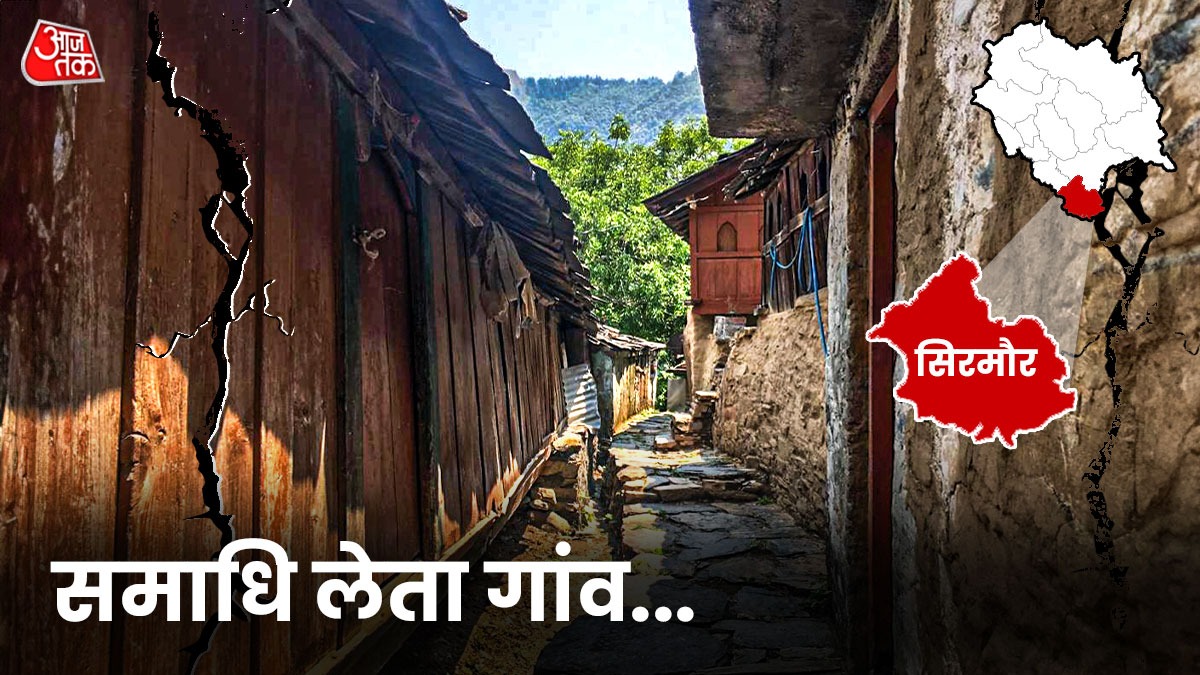Nestled amidst the undulating hilly terrains of the Sirmour district in Himachal Pradesh lies the little village of Shamah, a shy retreat far removed from the hustle-bustle of city markets, cinema halls and hospitals. It was the year 2013, when the Kedarnath tragedy sent shockwaves across the nation, that Shamah first glimpsed apocalypse – cracking soils and collapsing walls spewing forth unplumbed waters.
After long spans living beneath makeshift tarpaulins in neighboring villages, the people returned; to annually witness their crevices morphing into gaping chasms. Since then, the village, once home to over 400 souls, is desolate, with more than half its population vanished, leaving behind a skeletal community engaging death in a grim hide-and-seek.
Embark on a three-hour drive from Ponta Sahib, and you arrive at Shamah. Within a kilometer hike from the closest settlement of Tiloradhar, the village's ruinous reality starts to unfurl. Overshadowing your entrance are the crumbling remains of once multi-storied dwellings. Blue-pillared homes that now serve as cattle ties or grain dryers, their ceilings kiss the ground more intimately than ever intended.
One by one, villagers tearfully showcase their abodes—freshly cemented cracks over old ones, wider fresh fissures, lopsided courtyards, slanted roofs, all whispering the horror of a potential overnight collapse that could swallow them, or their entire existence.
A decade past, this village wouldn't weep upon being scraped; today, it sobs unabashedly, its tale narrated through bitter eyes and gritting voices as if retaining the fury of a maelstrom within.

Source: aajtak
At the upper echelons of the village resides Shanti Devi. Her three-room home currently shelters two—the lady herself and her 'old man', as she fondly addresses her spouse. Even with sure-footed steps, the brittle soil necessitates support. They prefer proximity, close enough to interact without risking much. The husband is bedridden.
Shanti recalls the panic of 2013 when tumbling mud and stone sent everyone scampering for life. The government allocated space in Tiloradhar's Tibetan Colony, from their spacious home they were reduced to tarp sheltered existence. Her spouse pined for the mountainous daal and potatoes; even adequate water was a luxury elusive.
Despite adversities, they endured. As time ticked, so did tensions with the Tibetan residents, who started voicing frustrations about their burgeoning presence. Clashes became frequent; supplies turned erratic. Eventually, disheartened yet determined, they returned to their ancestral home—dusting off the cobwebs, repairing what could be mended until new fractures dissuaded further fixes—'If it falls, it falls; where else can we go?' she questions.
The family? Her voice quivers, 'They're plenty—son, daughter-in-law, grandchildren—all in Ponta. Daily wage laborers, they live meal to meal. Us joining would only add strain. Grandchildren shy from visiting, fearing to tumble into the hidden hollows like hapless cattle.'
'The home we assembled bit by bit, now dismantles before our eyes. My old man breaks down. That sorrow surpasses everything,' speaks Shanti, her voice intermittently broken by a grief so palpable, as if waving a lingering goodbye to a forgotten season.
The village school, once brimming with laughter and learning, now unveils its desolate state. With foundations exposed, the walls bear inscriptions pontificating the virtues of opportunity and ability—but for a school bereft of students and hope, these words mock their very existence.
As we leave, villagers trail us, hopeful that capturing their plight might accelerate governmental response. Their paper-thin survival clings to the threads of each ticking second, echoing a silent prayer for change before they too become mere whispers in the folds of time.
A returning team of scientists, including
retired State Geologist Arun Sharma
, reiterates the urgency—'The village must relocate before it sinks entirely; procrastination could prove fatal.'




